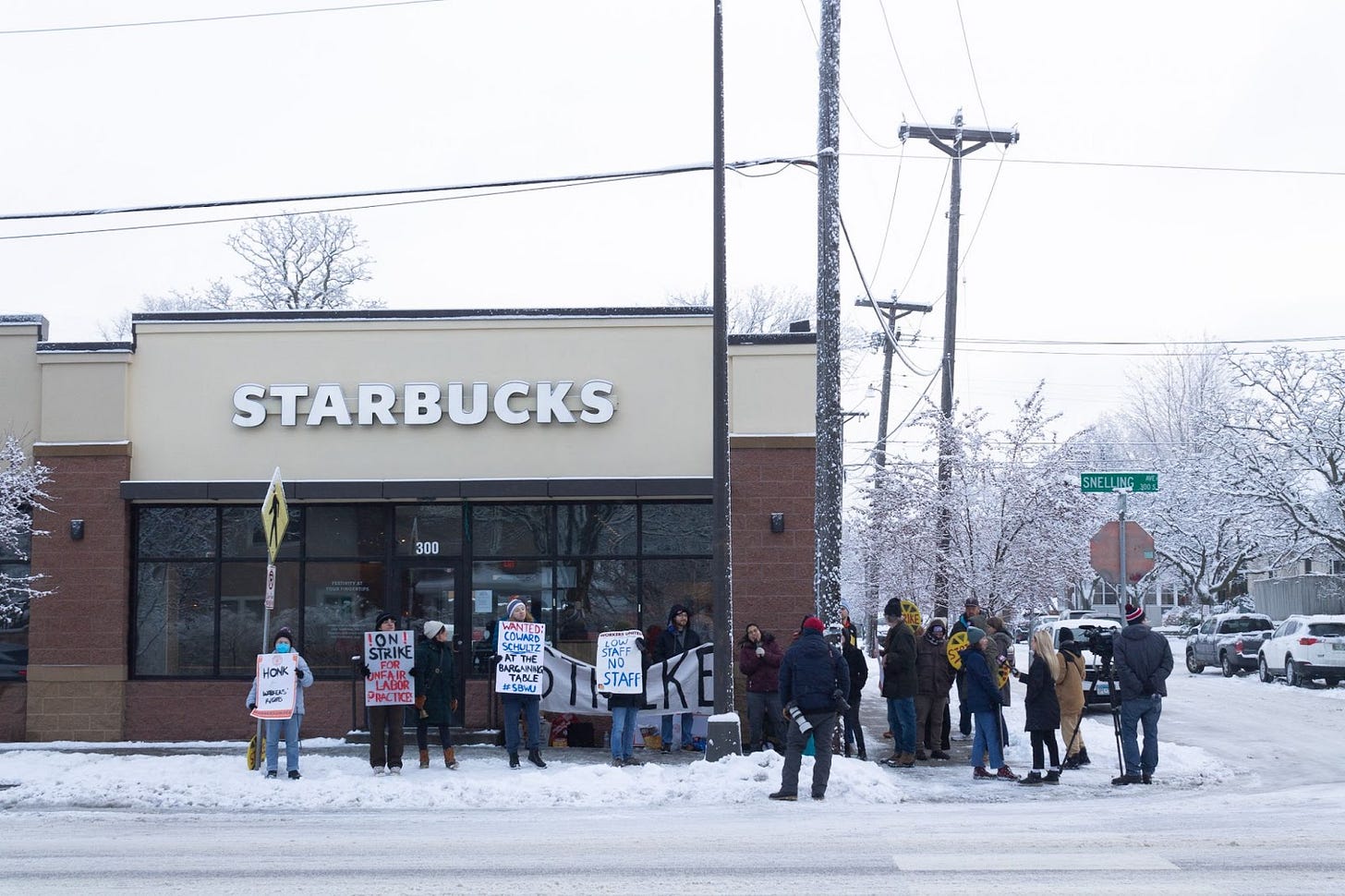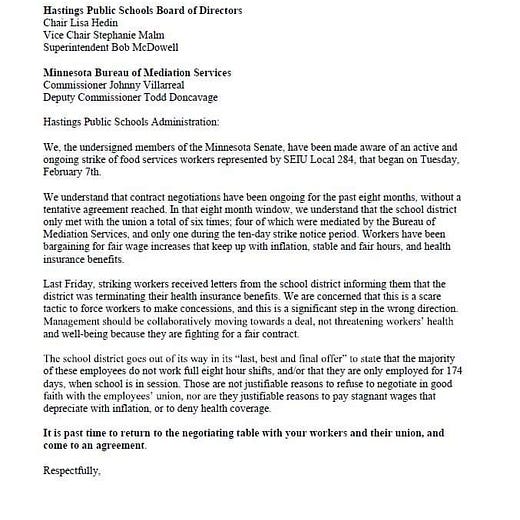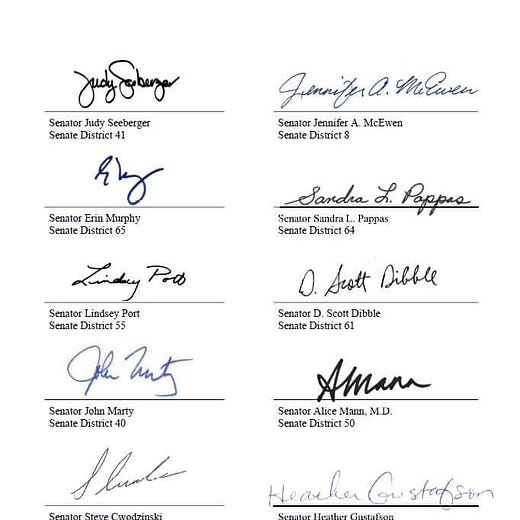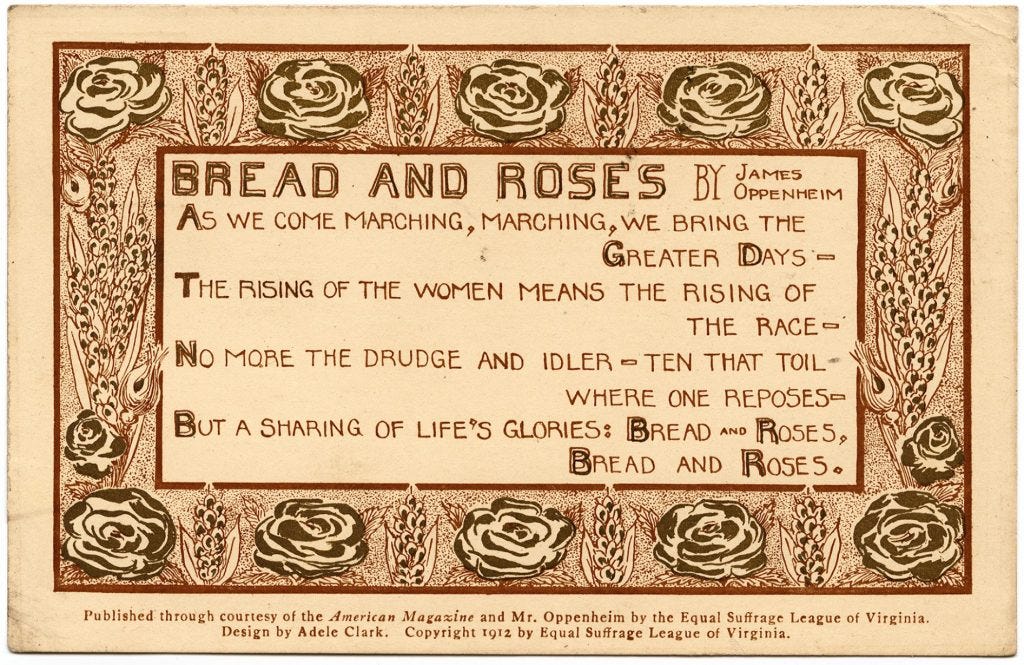How the war on workers is evolving
Workers are resisting oppression in its many forms, from drug testing to “soft” union busting, strike retaliation, and lobbying against safety infrastructure.
Howdy, friends! If you have a few extra minutes in your day, we’d appreciate it if you could fill out this survey. Thank you to those who have filled it out so far!
The latest from Workday Magazine
Sarah’s investigation into a frozen food manufacturer includes the story of a worker who had to start her life over after her arm was caught in a deadly machine: She Refused To Take a Drug Test Before Getting a Workplace Injury Treated—And Was Fired. Rich Products is the 117th largest private company in the United States and is on OSHA’s Severe Violator list for a workplace death in 2021. When companies use the coercive pressure of drug testing when workers have been injured, it makes workers less likely to report injuries.
In the aftermath of the Norfolk Southern derailment and controlled burn in Ohio, Sarah spoke with two workers from Railroad Workers United (RWU), a rank-and-file union movement that has been publicly criticizing the greed of the rail industry and calling for public ownership. The workers tell us that To Prevent Future Rail Tragedies, We Need to Nationalize the Rail System. Check out an In These Times cover story on the case for nationalizing the railroads with some beautiful illustrations by Jovana Mugoša.
Speaking of railroads, the Workday Magazine team led the Labor Education Service’s Minnesota Union Leadership Program session on workers in the media. We had the honor of hosting one of our publishing partners, The Real News Network’s editor-in-chief Maximillian Alvarez, as guest speaker, and he presented a brilliant case study on media coverage of the railroad workers.
We have an update to Sarah’s story, Palestinian Worker Says UN Refugee Agency Is Retaliating Against Him for Leading Strike. According to a statement by the United Nations Relief Works Agency on February 9, the strike ended and a technical committee was formed to resolve issues. But Jamal Abdullah, general president of the West Bank’s UNRWA staff union, tells Workday that there seems to be no intent from the agency to respond to the union’s demands anytime soon, and workers may go on strike again. Abdullah said the strike was suspended after an agreement was made between the Commissioner-General and the union to stop the investigation into Abdullah and start negotiating for a period of 10 days. However, he says, the Commissioner-General is changing the agreement by entering into a 6-month survey period with the committee. A reporter with +972 Magazine shows how conditions in refugee camps are in fact labor issues too, and highlights the United States’ role in funding the agency.
Isa’s story describes a stealth war by Starbucks on its workers. Across the country, baristas are being retaliated against and even fired for union organizing. The National Labor Relations Board just decided Starbucks must reinstate two workers in Philadelphia and give them back pay. What does “soft” union busting look like?
Ethan Carlson, a barista at the 300 Snelling Ave. S location, says that it feels like his store is “always perpetually understaffed,” causing stress for workers and customers. Yet, when the Starbucks workers went on their most recent strike on December 16, the stores conveniently were able to find enough managers and corporate staff to cross the picket line and keep the store running, he says, a resource that never seems to be available when workers are facing heavy workload and short staffing on an ordinary day.
Labor news roundup
Food service workers in Hastings, Minn., school district are continuing their strike after receiving a letter from the school district informing them about the termination of their health insurance benefits.
CBS News covered how wage theft is affecting workers in Minnesota, one of the only states where wage theft is a felony. Their reporting references the wage theft by Bartmann Group, which we’ve reported on!
Remember a few months ago when the Department of Labor filed a complaint against Wisconsin-based Packers Sanitation Services Inc. for violating child labor laws in meatpacking warehouses? They’ve now been found to have employed more than 100 children and fined $1.5 million. Casey Quinlan from Minnesota Reformer reported on the news, noting how a few states are considering loosening child labor laws.
What we’re reading
Our former editor, Filiberto Nolasco Gomez, who reported on prison labor, was interviewed for a column in the Minnesota Daily on recognizing inmates as workers.
In Dissent, a roundtable of workers and union leaders discuss how organized labor is addressing reproductive justice, in Reproductive Rights at the Bargaining Table. Rebekah Nelson, chair of the Governmental Affairs Commission for the Minnesota Nurses Association, mentions passing a resolution at MNA’s last convention on support for reproductive health justice, despite pushback from some members:
“Why did we do this? The MNA previously did not have a position on reproductive justice. My understanding is that former leaders didn’t want to take it up because they were afraid it was divisive. Although there were some historical barriers to getting this work done, it ultimately proved to be a popular position, and it passed without a lot of difficulty, in about six months.”
Tyler Walicek reports on the million dollar union-busting consulting industry for Truthout. Workers have always resisted many kinds of oppressive anti-union and anti-worker activities by their employers. Notice the co-optation of progressive rhetoric and marketing as employers fight against workers’ rights.
Speaking of environmental responsibility and overburdened workers, staff at the Environmental Protection Agency experiencing a staffing crisis are demanding a better promotion structure and an equity and inclusion program so the Biden administration can pursue its climate goals, according to Lylla Younes over at Grist.
Julia Rock’s reporting at The Lever shows how restaurant executives and union avoidance lawyers come together, reacting to wage theft and other unfair labor practices making headlines, as well as their own children calling them union busters.
Spring skills classes at Labor Education Service
Workday Magazine is housed in the Labor Education at the University of Minnesota, and our team is made up of some awesome labor educators! Be sure to check out our spring skills classes, all virtual, listed below. You don’t have to be part of a union for these!
Steward Training Wednesday, March 8, 2:00pm - 5:00pm
Art and Organizing Thursday, March 23, 4:30 - 5:30pm
The AFL-CIO and the Global Cold War Thursday, April 12, 3:00 - 4:30pm
Video Production for Organizers Thursday, April 25th 1:00 - 3:30pm
Labor Law for Organizers Thursday, June 8, 5:30pm - 8:30pm
Since February is the month for valentines, I wanted to share this fun fact with you: Saint Valentine is also the patron saint of plagues! Here’s a rosy postcard for you with the last stanza of the poem by James Oppenheim who was inspired by the words of textile worker and union leader Rose Schneiderman.
As we come marching, marching, we bring the Greater Days–
The rising of the women means the rising of the race–
No more the drudge and idler–ten that toil where one reposes–
But sharing of life's glories: Bread and Roses, Bread and Roses!
Sharing life’s glories! We are each other’s harvest.













I went to engineering college in the 80s because they advertised a job placement rate of 90%. That was true because the gas stations were still hiring graduates to pump gas, but when they all went self-serve, there were no more jobs for the graduates. Besides that, the Post office was looking to hire a bilingual quadriplegic to lick stamps. One friend, after graduating from Business Administration and sending out over 500 resumes unanswered, finally landed a job with 7-11 Stores dressing up as a Fuzzy-Bear and handing out suckers to kids as they walked by; but heatstroke in July was hell. He joined the Infantry. So, after multiple interviews by baby-boomer staff and being laughed at for having no job experience, we did what social misfits do when they are too dumb to make it in the real world: I decided to serve my country and joined the Armed Forces, which everybody says is an extension of social welfare. As my 3-year contract was up, I flipped a coin to decide whether to stay in or go to the airline to do the same work. I took the airline and four months later was out of a job. The Forces were drawing down, and no one else was hiring anywhere. After a year of odd jobs, I landed a job on the assembly line at an aircraft manufacturer.
The airline called back laid-off workers two years later, so I returned after enough toxic bullying and pranks. Twenty years later, in 2012, the airline outsourced us, sent the aircraft to third-world countries, and fired everybody.
According to Wikipedia, a welfare state is a form of government in which the state protects its citizens' economic and social well-being. It is based upon the principles of equal opportunity, equitable distribution of wealth, and public responsibility for citizens unable to avail themselves of the minimal provisions for a good life.
Responding to the wild charges by yellow journalism about the ‘welfare state’ and blaming ‘cradle-to-grave socialism,’ I speak as someone who, at age 47, lost a career along with 2000 others after 22 years with the same company. “…The current business model is unsustainable…” messaged the CEO from his laptop while lounging on his yacht in the Cayman Islands.
Note that in 2012, the number-one song on the charts was Fun-We Are Young by Janelle, and plastic surgeons were doing a roaring business for 30-somethings who were paranoid about losing out to 20-somethings climbing the corporate ladder.
With a family of 6 and a mortgage at the time, I can attest beyond any stretch of the imagination that wanting to work for a living makes you a second-class citizen. We are accustomed to assuming that some government agency will look after everything when things go wrong.
But if your house is on fire and you knock on the neighbor’s door to call for help, he’ll slam the door in your face because you interrupted his reality TV show, his Facebooking, and his Rush Limbaugh talk radio. Meanwhile, 150 people will have shown up with their smartphones to record a video of your house burning down. In the new millennium, it’s all about winners and losers, and winners have money and losers don't; it’s not how you play the game it’s if you win or lose because anything less than too much isn’t enough, and anything other than winning big is losing big, and if you’re explaining, you’re losing; and if you ever have to ask why, you wouldn’t understand anyway because if you ever had to get your hands dirty or put yourself or your money at risk, it means you’ve missed the boat in life.
It’s all my parent's fault because they didn’t teach me the secret handshake, how to play the stock market and win, how to sell people things that don’t exist, or how to launder other people's money.
Sure: there is the unemployment insurance agency with hundreds of civil servants shuffling paper and endless appointments requiring an answer for months and even years. Sure, then there are the private sector job search techniques courses given by people who graduated from university but - with no luck finding a job - went into business to instruct unemployed people on: “how to land that dream job.” At one workshop, the coach showed me a Facebook page with my name on it with slanderous photos and informed me that I would never get an interview like this. I iterated that I was not even on Facebook, but he shrugged and said he didn’t know what to tell me because 'that’s just the way it is.'
Then there are the recruiting agencies staffed by 20-something airbrushed supermodels who were peddling wireless contracts at an iPhone boutique 3 days prior, and now they are ‘recruiting specialists.’ But a 40-plus who goes to a job interview is ‘over the hill.’ Indeed, if you aren’t a smooth talker with a chicklet smile and a big ten-inch, these recruiters - who know nothing about the job they are interviewing you for - will show you the door as if you have never worked a single day in the industry.
Oh, and don’t forget the online recruiting software such as TALEO, designed to reduce the pile of applicants by a 7-microsecond process of elimination that triages and seizes the ‘dirty words’ on resumes, I.E.
- Teamwork (this means you cannot work autonomously)
- Parent volunteer for… (this means that, with children, you may have unexpected issues)
- Past military service (this means you are mentally unstable and couldn’t make it in the real world)
- Hobbies, such as woodworking or hiking (this means you may have a life outside of work and don’t care about the company).
- 22 years with the same company (this means (a) you were ‘dependent’ upon a job, like being ‘dependent’ upon welfare; (b) you will bring your bad habits with you)
The list goes on, and if your resume is snagged, you are banned for life by every company that uses TALEO from that moment onward. Yesterday’s ‘good, steady worker’ is today’s deadbeat.
You will hear people say: “…it’s all because of the unions…” and “…nobody wants to work anymore…” a million times everywhere you go. Headlines:
- B777 jet engine explodes on takeoff, grounding flight to Japan. Vehicles below pelted with engine debris. Feds gagged news video immediately.
- Reliance Industries files for bankruptcy after Dioxin spill; taxpayers foot bill for toxic cleanup.
- Elliot Lake Mall collapses: 3 dead, amid debates to avoid costly building maintenance.
- Emergency Ward chief physician sends injured machinist back to work same day: lambastes ‘union slackers’ and workmen’s compensation boards; saying “you can answer the phone – you can do paperwork – you can empty the trash cans…” while snapping his fingers.
- Logistics driver stops for coffee while fighting to stay awake at wheel; boss GPS’s him and fires him.
- Romney lectures select group on ‘givers and takers’ saying half the country ‘doesn’t pay taxes.’
- Conservative think-tank urges feds to raise pension age to 67, criminalizing seasonal workers, telling fishermen and farmers that ‘there’s always work out there; Donut shops and McDonalds for example’.
- Railway boss of Megantic disaster visits townspeople: reassuring them of employee error and firing of train engineer. Headlines of the era:
- Ranstad worker fired for missing work to be with his hospitalized 3-year old child; call-center agent then fired for defending worker. Child died afterwards then father took his own life.
- Siemens abandons 1.3 billion-dollar venture after three-fourths completed; city stuck with unsalable plant and 5-year tax holiday.
- Underemployed man and family evicted from shelter trailer on his property after his home burns down: neighbors fear property values might fall; shouting “riff-raff not welcome.”
- Machine shop set ablaze after harassed disgruntled worker entered at night and doused gasoline; found dead by firefighters after fire caught up with him. Shop, closed for investigation, loses contract with customer; 60 employees now jobless.
- Textile mill burns in Bangladesh: child laborers perish behind doors locked to prevent theft. Security guards open gunfire on escaping workers.
- A group of Walmart store employees discuss forming a union: head office responds by closing store. Employees endure boos and threats from colleagues.
- Landmark hotel shuts down after employees vote for increase from minimum wage. The landmark was then demolished.
- Sears files for Chapter 11: 150,000 jobs gone, top brass get $25M, fund managers collect hefty commissions.
- City transit shop employee opens fire, killing 6 colleagues and takes own life. Coroners cited a toxic workplace, bullying, and jeering him about his stutter, depression, and financial woes.
- Outsourced lift truck worker crushed to death on 3rd day of work, lack of training blamed.
- Man dozed off at wheel, incinerated in vehicle ‘worked two full-time jobs’ to make ends meet, -says widow.
In 2012, the War on the Worker was in full open season. Monetization, anti-union, anti-labor, and neoliberal agendas were not only public policy but de rigueur in popular perception. Someone who had fallen on hard times would be publicly admonished by their neighbors as a ‘slacker’ for not having had 50 new job offers the same day and was, therefore, stealing their hard-earned inheritance. If you want to compete with the third world, you must become the third world.